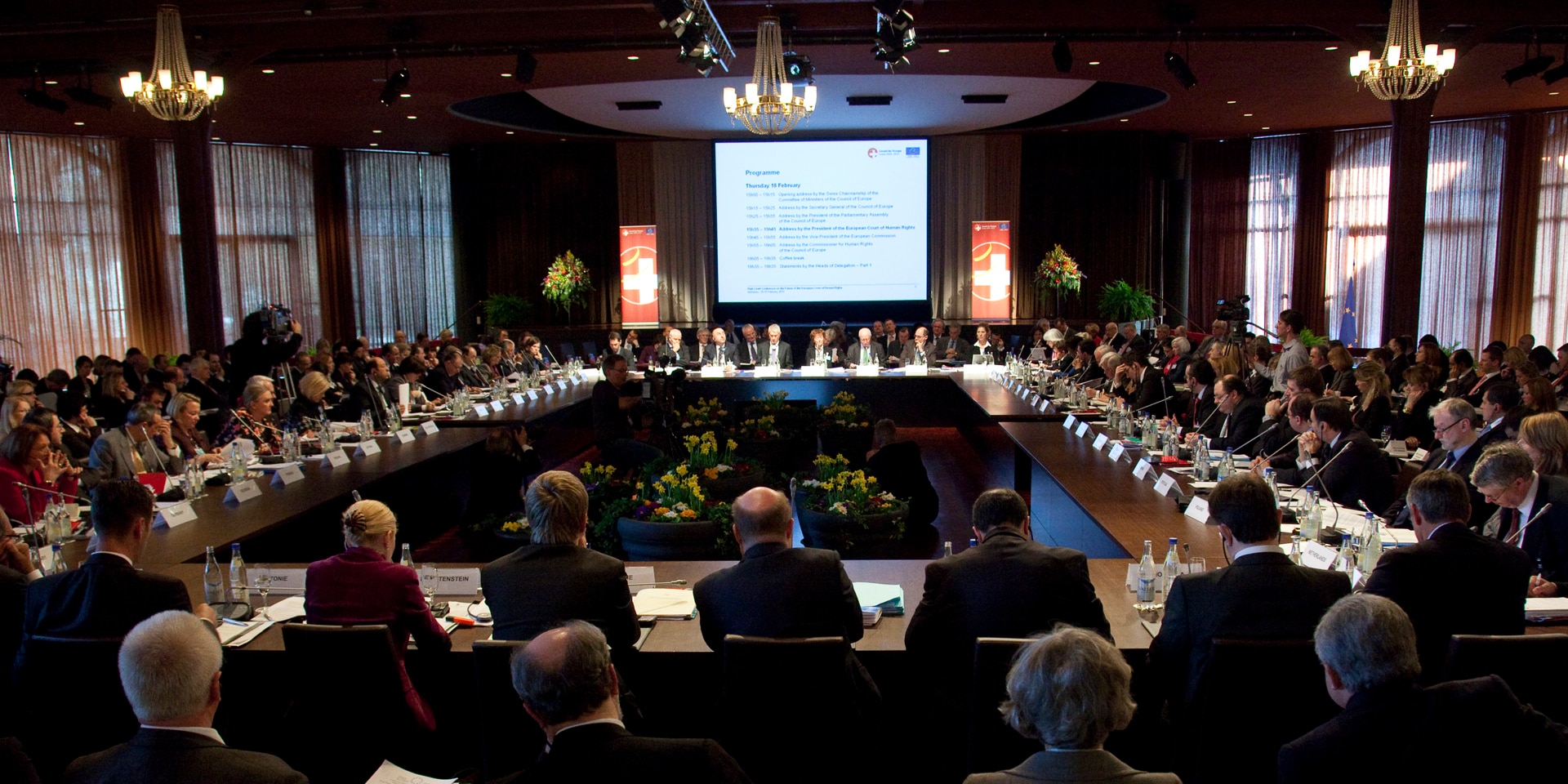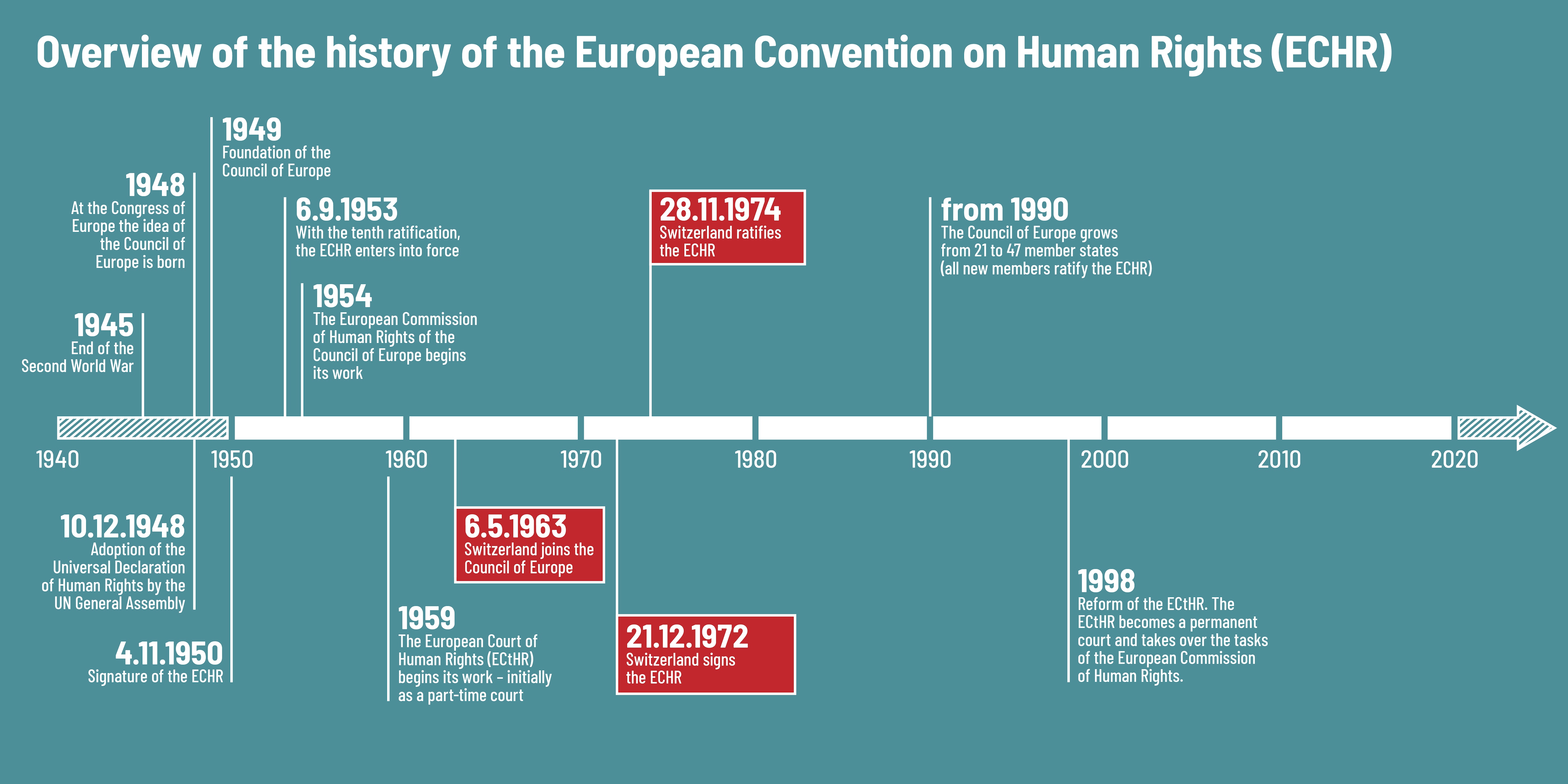The European Convention on Human Rights celebrates its 70th anniversary
The European Convention on Human Rights (ECHR) was initiated and drafted by the Council of Europe, and signed on 4 November 1950. The 70th anniversary of this common endeavour is highly significant for Switzerland, as the Convention's key elements are also among the priorities of Swiss foreign policy. Historic and enduringly relevant, the ECHR is now making inroads in the digital world.

Ministerial Conference, February 2010 in Interlaken: Switzerland chaired the Committee of Ministers at that time and launched a reform process. © FDFA, Yoshiko Kusano
The day begins. I read the paper, comment on a social media post, and send off some work documents. I go to church, hand out flyers on climate change, spend time with my children, and take part in a debate on the upcoming elections. Each of these everyday actions is underpinned by rights and freedoms, by a convention that protects them, and by a court we can turn to if those rights are denied. The European Convention on Human Rights makes a significant contribution the lives of individual people by offering them a global mechanism for monitoring the respect of human rights. Today, around 830 million people are entitled to bring cases before the European Court of Human Rights in Strasbourg.
The ECHR is now 70 years old, but it is still able to adapt and meet the needs of a constantly changing world. Originally created to avoid repeating the horrors of the Second World War and to guarantee peace and justice in Europe, it is now responding to new challenges in cyberspace. In times of crisis such as the current coronavirus pandemic, protecting human rights is as central as it ever was for Switzerland and the other member states.
Values anchored in Switzerland's constitution, foreign policy and legal system
Switzerland's humanitarian tradition means it plays an important role as an ambassador for human rights. It collaborates with institutions and states and makes use of an international legal framework to reinforce the universality of human rights such as the right to life, the prohibition of torture, and the right to freedom, security and a fair trial. Switzerland has been a member of the Council of Europe since 1963, and has ratified numerous conventions alongside the other 46 member states, the most famous being the ECHR, which it signed in 1972. That year also marked another important event in Swiss history: the introduction of women’s suffrage was expedited to allow Switzerland to ratify the ECHR.
As noted by Federal Councillor Ignazio Cassis, this instrument for protecting the rights of citizens is deeply rooted in the foundations of the Swiss political system, which is defined by democracy and the rule of law. Articles 7 to 33 of the Swiss Federal Constitution of 1999, for example, list fundamental rights that are in large part inspired by the ECHR. The legal system provides another illustration: the Convention is a point of reference for legislation and court decisions in Switzerland and Europe.
The needle of Switzerland's foreign policy compass is also guided by the universality of these rights – a priority that is emphasised in the various thematic areas of the Foreign Policy Strategy for the period 2020–23. For Switzerland, multilateral collaboration is the key to achieving this objective.
An instrument that has kept pace with coronavirus and digitalisation
Seventy years ago, problems such as internet security, gender issues, data protection and the relevance of human rights during health crises like the current pandemic were either very different or didn't exist at all. Thanks to its dynamism, the Council of Europe provides a fundamental platform for the multilateral collaboration needed to tackle the global challenges of today.
The COVID-19 pandemic has pushed the theme of freedom to the top of the agenda, for it is during moments of crisis that human rights and the rule of law are at risk. Emergency public health measures such as the obligation to close bars, work from home and wear a mask restrict rights such as the freedoms of movement and assembly. In the immediate future, the member states of the Council of Europe face the challenge of reconciling a continuing state of emergency with human rights and the rule of law.
It is also worth considering the interplay between human rights and cyberspace: they may seem a strange pairing, but they are actually closely interlinked – especially in the current situation. As we work from home, our days are increasingly punctuated by mouse clicks, emails and video calls, and populated by internet service providers, algorithms and artificial intelligence. "The ECHR makes a fundamental contribution to safeguarding democracy and the rule of law in the digital world. It also helps us extend our protection of human rights such as freedom of information, freedom of opinion and data privacy to online spaces, for example with regard to social media and artificial intelligence," says Thomas Schneider, Switzerland's co-representative on the Steering Committee on Media and Information Society of the Council of Europe. In recent years, the Council of Europe has developed various soft law instruments to achieve such objectives. Because they are not legally binding, they can be developed more quickly and adapt to changes if necessary. Through its multilateral efforts, Switzerland has endeavoured to create the framework conditions for a global digitalisation policy that promotes the accessibility and use of data for social and economic development.
Switzerland and the Council of Europe
The 70th anniversary of the ECHR offers the chance to look back on Switzerland's work within the Council of Europe. The organisation has provided Switzerland with a platform for exchange where its contributions are made on equal terms with the other member states.
The fundamental values defended by the Council of Europe are the protection of human rights, democracy and the rule of law: elements that are also the basis of the Swiss Constitution. This connection has led Switzerland to play an active role in the Council of Europe since joining in 1963. For example, during its chairmanship of the Council of Europe in 2010, Switzerland initiated an important reform of the European Court of Human Rights (this took place during the conference held on 18 and 19 February in Interlaken, subsequently known as the 'Interlaken Process').
Ministerial session of the Council of Europe: Ignazio Cassis stresses the importance of close cooperation between states
"In these unusual times, close cooperation between our states is the only adequate response to the difficulties we are currently facing," stated Federal Councillor Ignazio Cassis at the 130th session of the Committee of Ministers of the Council of Europe (CoE). Under Greece's chairmanship, the foreign ministers at the session adopted the 'Athens Declaration', reaffirming their existing commitments to respond effectively to public health crises while respecting human rights, democracy and the rule of law – the CoE's founding values. Key representatives also met to celebrate 70 years of the European Convention on Human Rights (ECHR).

